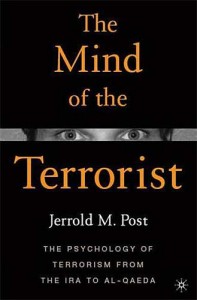|
Reviewed by Jonathan Eric Lewis, Juris Doctorate candidate at the University of Connecticut School of Law Jerrold M. Post, an expert on political psychology, sets out to explore what leads individuals to turn to terrorism in The Mind of the Terrorist: The Psychology of Terrorism from the IRA to Al-Qaeda. Throughout the course of the text, Post persuasively argues that, unlike some of history’s most infamous mass murders, terrorists are not insane. He skillfully debunks the myth that those who commit violent acts for political reasons must somehow be unhinged. Terrorists, Post writes, are “‘normal’ in the sense of not suffering from psychotic disorders.” To say that terrorists are not mentally ill, however, is not to say that they haven’t suffered traumas (either real or perceived) that led them down the path of political terrorism. The Mind of the Terrorist looks at a wide array of terrorists and shows how people are not born terrorists; rather, they are socialized from youth to believe that violence is an acceptable means for achieving political goals. An overview of the psychology of terrorist movements and of their leaders, Post’s latest book is well-written and free from academic jargon. The chapters on Palestinian terrorism, the PKK (Kurdistan Workers Party), and al-Qaeda would be of most interest to both scholars and policymakers who focus on the Middle East. Post is at his strongest when he analyzes the words and language used by terrorists themselves. Post takes terrorists seriously and at their word, and he asks his readers to do the same. For instance, in the chapter on secular Palestinian terrorism, Post provides the reader with a psychological profile of Omar Rezaq, a member of the extremely violent Abu Nidal Organization, who skyjacked an Egypt Air plane in 1985 and shot five American and Israeli hostages in cold blood. Rezaq, though violent, was not crazed, nor was he psychological ill in any technical sense. Post had the chance to interview Rezaq and concluded that Rezaq had, since boyhood, been socialized to be a violent terrorist. “Like his fellow terrorists, Rezaq believed that his actions were justified; they were not wrongful but were righteous acts in the service of the Palestinian revolution.” Post refers to the “generational transmission of hatred” in Rezaq’s case, pointing out how Rezaq was motivated by a desire to avenge the alleged wrongs inflicted on his family. While Post’s analysis of Rezaq’s road to terrorism is compelling, the chapter on the Kurdish Workers Party (PKK) is the strongest of the book. In this chapter, the author provides an invaluable profile of Abdullah Ocalan, the charismatic leader of the notoriously violent Kurdish terrorist group. Post examines Ocalan’s “self-portrait” as an opponent of both the Kurdish tribal structure and the Turkish state and discusses the development of Ocalan’s cult of personality. “At the core of Ocalan’s leadership,” writes Post, “is an intensely narcissistic personality.” While Post’s profile of Ocalan is fascinating, one is left wishing there would be more information in this chapter about why many Kurds, both within and outside Turkey, continue to mythologize Ocalan. Policy analysts and experts on counter-terrorism would be well advised to take a look at the final chapter in which Post lays out the “elements of a psychological program designed to counter terrorism.” Post rightly says what many do not want to hear, namely that terrorism cannot be eradicated. It can, however, be reduced to the extent “that it interferes as little as possible with our open way of life.” Post is likewise spot-on when he suggests that an important psychological tactic for counter-terrorism specialists to employ would be to produce dissension within terrorist groups. “It is important to foster paranoia and organizational paralysis by injecting rumors in the ranks.” Unfortunately, the section on creating dissension within terrorist groups is too short. The book would stand to benefit if the author committed a full chapter to this idea, rather than four paragraphs. With that said, The Mind of the Terrorist is worth reading and considering. Post’s work would be of great value to those first learning about terrorism; and The Mind of the Terrorist would be an ideal text for an undergraduate course where, more often than not, students enter the class with many misconceptions about terrorism. Scholars working in Middle Eastern studies, particularly those who continue to insist that terrorism’s roots are primarily economic, likewise would be well advised to read Post carefully and with an open mind. Terrorists are far more than crazed individuals or the products of Western injustice. They have their own ideas, their own visions of the world, and their own conceptions of what acts are permitted in the name of their causes. Post’s book provides a valuable service in emphasizing this significant, although often forgotten and neglected point. |


 The Mind of the Terrorist: The Psychology of Terrorism from the IRA to Al-Qaeda
The Mind of the Terrorist: The Psychology of Terrorism from the IRA to Al-Qaeda